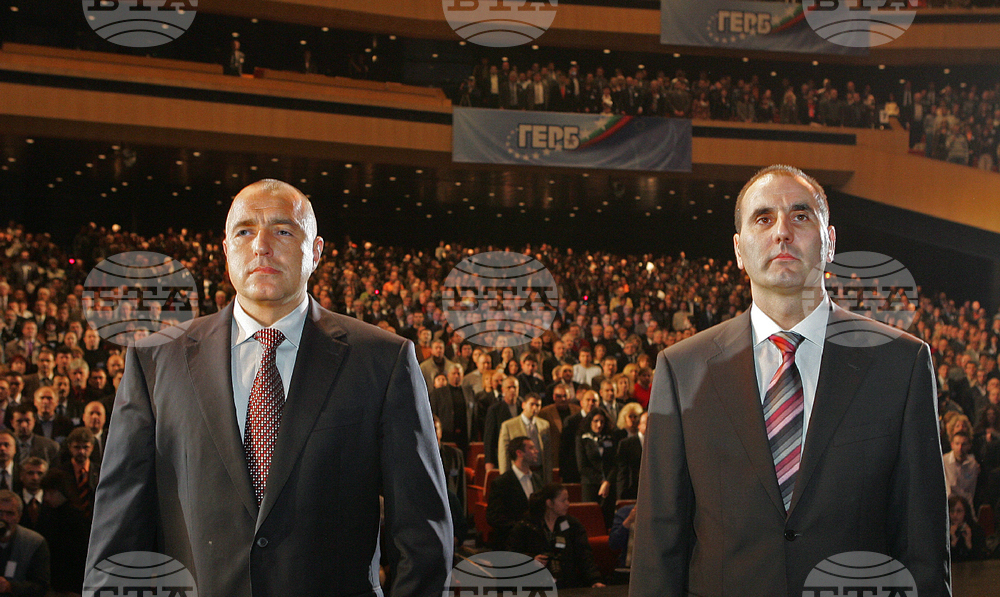site.btaDecember 3, 2006: GERB Party Established in Sofia


Eighteen years ago today, the GERB party was formally established in Sofia. Its name is an acronym of Grazhdani za evropeysko razvitie na Bulgaria [Citizens for European Development of Bulgaria]. Tsvetan Tsvetanov was elected Chairman but Boyko Borissov has been de-facto leader since its commencement (and de jure leader since 2010). GERB was entered in the register of political parties on March 6, 2007.
GERB has since dominated political life in Bulgaria. It has been the largest political force in most Parliaments since 2009 but in recent years it has been unable to form a majority and lead a government, prompting a series of snap elections.
It also saw its candidate Rosen Plevneliev win the presidential elections in 2011.
Following are GERB's results in all parliamentary elections ever since its establishment in 2006:
2009 - 39.72% (Number 1 party in Parliament); 2013 - 30.55% (1); 2014 - 32.67% (1); 2017 - 32.65% (1); April 2021 - 25.80% (1); July 2021 - 23.21% (2); November 2021 - 22.44% (2); 2022 - 24.48% (1); 2023 - 25.39% (1); June 2024 - 23.99% (1); October 2024 - 25.52% (1).
Here is how BTA's English-language service reported the establishment of GERB on December 3, 2006:
GERB Constituted as New Political Party
GERB was constituted as a new political party here on Sunday. The party is based on the fundamental principles of "civil liberties", "Europeanization", "equal opportunities" and "prosperity." GERB is preparing seriously for participation in all future elections.
GERB is a Bulgarian acronym standing for "Citizens for European Development of Bulgaria." The name makes a deliberate pun on the Bulgarian word meaning "coat of arms."
"Politics must change, stop serving narrow partisan economic interests, and start serving civil society," newly elected GERB Chairman Tsvetan Tsvetanov said, welcoming the nearly 4,000 delegates and guests of political parties at the constituent meeting. "We cannot advance along our European road led by played-out politicians, burdened by their past," he noted.
He finds an obvious void in the right-of-centre segment of the political spectrum and a lack of a party which has the will and the resources to rise and put an end to the present status quo. "We must stop the attempts of the old political class to stifle everything new and creative," Tsvetanov also said.
The purpose of the party is to bring together the Right-minded people in Bulgaria, the Chairman told a news conference after the constituent meeting. "We are open to all democratic, Right-oriented voters." He added that the party will not join election campaign coalitions but will coalesce with right-of-centre parties in case it does not command a sufficient majority. Asked about possible coalitions with the Simeon II National Movement (SNM) and the Bulgarian Socialist Party (BSP), Tsvetanov said that "the three-party ruling coalition [consisting of the BSP, the SNM and the Movement for Rights and Freedoms] is our principal opponent for the time being. " "If, in future, any of the three parties leaves the coalition and shows by its behaviour that it is right-of-centre, we can partner with it after possible elections," Tsvetanov said.
Asked about his expectations in connection with the forthcoming elections of Bulgarian members of the European Parliament, the Chairman expressed his confidence that GERB will have the largest number of Bulgarian MEPs. GERB's principal strategic partner in the European Parliament is the CSU in the European People's Party.
Speaking at the constituent meeting, GERB's informal leader Boyko Borissov stressed the fight against organized crime and corruption, family values and judicial reforms. He criticized the power-holders about their reaction to the attempt of European Parliament rapporteur on Bulgaria Geoffrey Van Orden to secure a new lease of life for Kozloduy N-Plant Units 3 and 4. According to Borissov, GERB's economic programme focusses on tax relief for investors, financial decentralization, lowering the value added tax rate, reducing the personal income tax rate to 10 per cent, and setting the monthly tax threshold at 800 leva.
The constituent meeting was attended by leaders of the Bulgarian Agrarian National Union - Popular Union, the European Democratic Road, the Bulgarian Agrarian National Union, the Internal Macedonian Revolutionary Organization and the Social Democrats Political Movement. SNM leader Simeon Saxe-Coburg-Gotha, the European Right, and the Euro Roma Movement sent congratulations.
Right-wing opposition Democrats for Strong Bulgaria told BTA they see no opportunity for cooperation with GERB. SNM Deputy Chairman Nikolai Svinarov noted that after GERB position themselves in the political sector, joint work for Bulgaria's better governance and better destiny could be pursued with them. Right-wing opposition Union of Democratic Forces Deputy Chairman Ivan Kolchakov expressed the hope that the constitution of the GERB Party will benefit the development of the political and public model in Bulgaria. "We hope that they will work for the interests of Bulgaria's citizens," Kolchakov said. Ataka leader Volen Siderov described the GERB Programme as "wishful thinking." "There is nothing that sets it apart from the rest," he commented.
GERB was originally established as a not-for-profit association for pursuit of public-benefit activities and was registered by the Sofia City Court on March 29, 2006. Its purposes were to develop and assert civil society in connection with Bulgaria's European development and prosperity, to establish contacts among associations and organizations on the basis of Bulgaria's European integration, and to organize information and reference activity for popularization of Bulgaria's European integration.
GERB's informal leader, Boyko Borissov, is currently Mayor of Sofia, after serving as Chief Secretary of the Interior Ministry in Bulgaria's previous cabinet, headed by Simeon Saxe-Coburg-Gotha. In public opinion polls, Borissov invariably figures among the most popular politicians in this country. Tsvetanov was his assistant at the Interior Ministry and is now Sofia Deputy Mayor in charge of security.
/NF/
news.modal.header
news.modal.text